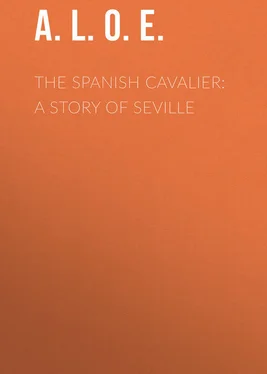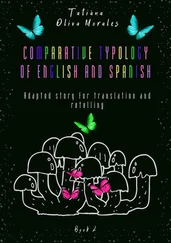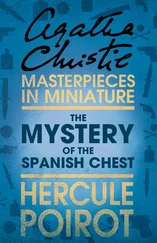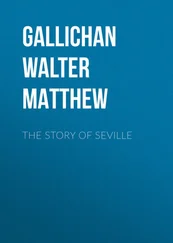A. L. O. E. - The Spanish Cavalier - A Story of Seville
Здесь есть возможность читать онлайн «A. L. O. E. - The Spanish Cavalier - A Story of Seville» — ознакомительный отрывок электронной книги совершенно бесплатно, а после прочтения отрывка купить полную версию. В некоторых случаях можно слушать аудио, скачать через торрент в формате fb2 и присутствует краткое содержание. Жанр: foreign_antique, foreign_prose, на английском языке. Описание произведения, (предисловие) а так же отзывы посетителей доступны на портале библиотеки ЛибКат.
- Название:The Spanish Cavalier: A Story of Seville
- Автор:
- Жанр:
- Год:неизвестен
- ISBN:нет данных
- Рейтинг книги:3 / 5. Голосов: 1
-
Избранное:Добавить в избранное
- Отзывы:
-
Ваша оценка:
- 60
- 1
- 2
- 3
- 4
- 5
The Spanish Cavalier: A Story of Seville: краткое содержание, описание и аннотация
Предлагаем к чтению аннотацию, описание, краткое содержание или предисловие (зависит от того, что написал сам автор книги «The Spanish Cavalier: A Story of Seville»). Если вы не нашли необходимую информацию о книге — напишите в комментариях, мы постараемся отыскать её.
The Spanish Cavalier: A Story of Seville — читать онлайн ознакомительный отрывок
Ниже представлен текст книги, разбитый по страницам. Система сохранения места последней прочитанной страницы, позволяет с удобством читать онлайн бесплатно книгу «The Spanish Cavalier: A Story of Seville», без необходимости каждый раз заново искать на чём Вы остановились. Поставьте закладку, и сможете в любой момент перейти на страницу, на которой закончили чтение.
Интервал:
Закладка:
The Spanish Cavalier: A Story of Seville
CHAPTER I.
THE COUNTING-HOUSE
He has not made his appearance in the office to-day!" exclaimed Mr. Passmore, the working partner in an ironware manufactory in Seville. "If this Señor Don Alcala de Aguilera think it beneath his dignity to keep faith with his employer, and stick to his business, I'll find some one else who will. The high and mighty caballero may smoke his cigar, or take his siesta, like the rest of his lazy nation; I'll not disturb him, though his nap should last till the Moors come again!" Mr. Passmore rubbed his heated face with his spotted handkerchief as he concluded his speech, for the fiery sun of Andalusia had not yet sunk, and the small office-room attached to his manufactory glowed like one of his own furnaces.
"De Aguilera may have been kept away by illness, sir," suggested Lucius Lepine, a young English clerk in the employ of the manufacturer. "He appeared to be far from well yesterday, when translating the letters from Madrid."
"And a pretty hash he made of the business," exclaimed Mr. Passmore in a tone of irritation, yet unable to refrain from laughing. "The don's thoughts must have been wandering to the Plaza de Toros, 1 1 Circus for bull fights.
or he would scarcely have made out that Tasco and Co. sent our firm an order for twenty dozen bulls instead of knife-blades."
"De Aguilera is not wont to make such blunders," said Lucius, who had sympathy for his fellow-clerk, partly arising from a belief that their circumstances were somewhat the same – that the proud Spaniard had been, like himself, driven by necessity to work under one who, by birth and education, belonged to a sphere much lower than their own. "I thought," continued Lepine, "that De Aguilera looked very ill."
"Ill! yes, he always looks ill – as if he fed, or rather starved, on chestnuts and raisins," interrupted Mr. Passmore, "and had never tasted a slice of good roast beef in the course of his life! I guess there's many a one of the whining beggars that beset one in the Calle de los Sierpes, that fares better than the caballero Don Aguilera. And yet, forsooth, the señor must keep his horse (a lean one, to be sure), and carry himself with a lofty air, as if he were, at the least, Secretary of State to Queen Isabella! I do believe that his worthiness never made his appearance to-day, because I offended his dignity yesterday by calling him simply 'Aguilera,' without all the fine additions to a name already too long, which Spaniards wear as their mules do tassels and fringes, I suppose, to make one forget the length of their ears!" Mr. Passmore rubbed his hands in evident enjoyment of his own joke, and laughed his peculiar, explosive laugh, which reminded his hearers of the snort of a hippopotamus rapidly repeated. Lucius was not inclined to appreciate or join in his mirth.
"By-the-by, Lepine," said the manufacturer abruptly, "would you like to go to the bull-fight to-morrow? for if so, I'll treat you to a seat, as I'm going myself. As these affairs always come off on a Sunday, there will be no business time lost."
Had the offer been an acceptable one, the coarse air of patronage with which it was made would have prevented the young Englishman from feeling grateful for an invitation so proffered. But Lepine's views of keeping the day of rest were by no means in harmony with the sickening horrors of the Plaza de Toros, and he rather coldly replied, "I thank you; but I have no wish to witness a bull-fight."
"Nor I, nor I; but just for once in a way, one must do at Rome as the Romans do," observed Mr. Passmore, as he fastened the clasp of the large ledger-book in which he had been making some entries at the end of the week. "Barbarous spectacle it is, disgraceful to any civilized people, but quite in harmony with Spanish character. A century or two ago," (Mr. Passmore was less accurate in his chronology than in his accounts,) "these people had their autos-da-fé, 2 2 Public burning of those convicted of heresy, or what the Church of Rome regarded as such.
in 1868 they must have their bull-fights; fire or blood, fire or blood, the only means of rousing them up from their lazy lethargy, and keeping them wide awake for a couple of hours!" Peter Passmore, himself a sharp trader and active man of business, regarded idleness as one of the greatest of sins.
"Bull-fighting causes a waste of human life," began Lucius; but his employer cut him short.
"I don't think much of that," observed Passmore. "If a fellow choose to run the chance of getting a horn between his ribs, I'd let him have his fancy; if he's killed, there's but one fool less in the world. Ho, ho, ho! But it's a disgraceful waste of horse-flesh. Not but that the Spaniards, to do them justice, manage the thing in an economical way. They send blindfold into the circus poor brutes only fit to be made into dogs' meat, and the bull does the job of the knacker, that's all!"
An expression of disgust crossed the frank features of Lucius Lepine. He was impatient to leave the counting-house; but as to him belonged the duty of shutting up the place, he was unable to quit it till his employer should please to depart. Mr. Passmore was in a conversational mood; and while his short, thick fingers slowly tied up some bundles of papers, he went on talking, regardless either of the oppressive heat of the room or the impatient looks of his hearer.
"Spain will never be much of a country," said Passmore, "until her people learn to do their own business, manufacture their own wares, lay down their own lines, instead of making over everything that is useful to strangers. The dons leave others to cut up their meat for them, and think it condescension enough if they open their mouths to eat it! Ho, ho, ho! Idleness is the bane of this land."
"And superstition," added Lucius Lepine.
"Ay, superstition, as you justly observe. The country is eaten up by a swarm of lazy monks and friars, who tell their beads instead of tilling their ground, and who make every other day a saint's day, to give the laity an excuse for being as idle as they are. If I'd the rule here," continued Mr. Passmore, "I'd make a clean sweep of them all; turn the convents into parish unions, and clap into them all the beggars. What Spain wants to make it a fine land, as fine a country as any in Europe, is a better government, a more vigilant police, brisker trade, and – "
As the manufacturer paused, as if at a loss for words with which to wind up his oration, Lucius suggested – "a purer religion."
"Ah, there's one of your Exeter Hall notions," cried Peter Passmore, tossing down on the table the packet which he had just fastened up with a bit of red tape; "you young hot-brains are always ready to air your romantic ideas on subjects which you don't understand." Let it be observed, in passing, that young Lepine seldom uttered a dozen consecutive words on any subject whatever in the presence of his employer; but the manufacturer, probably from liking to monopolize the talking, was wont to accuse of loquacity every one with whom he conversed. "But hark'ee, young man," continued the principal of the firm, in a tone rather more dictatorial than usual, "I'd advise you, whilst you remain in Seville, to lock up your fanatical notions as tight as you would your cash-box. The Plaza is not Piccadilly, nor Isabella our good Queen Victoria. The Inquisition may not be actually catching and squeezing victims to death, as in the old times; but, as Joe Millar would say, 'The snake is scotched, not killed.' The priests, lazy as they are, will be sharp enough, in both senses of the word, if any one meddle with their profits. Don't you be playing the Don Quixote against what you are pleased to call superstition. It is not only in the Plaza de Toros that a fool may wave a red rag, go full tilt against an enemy too hard for him, and find himself caught on the horns of a dilemma. You may get yourself into grief," continued the oracular Passmore; "and I've no mind to spend time or money in fishing my clerk out of prison, if he manage to stumble into one unawares. That's no part of the bargain between us; so I give you fair warning, my lad." Taking up his hat as he ended his oration, Peter Passmore quitted the place.
Читать дальшеИнтервал:
Закладка:
Похожие книги на «The Spanish Cavalier: A Story of Seville»
Представляем Вашему вниманию похожие книги на «The Spanish Cavalier: A Story of Seville» списком для выбора. Мы отобрали схожую по названию и смыслу литературу в надежде предоставить читателям больше вариантов отыскать новые, интересные, ещё непрочитанные произведения.
Обсуждение, отзывы о книге «The Spanish Cavalier: A Story of Seville» и просто собственные мнения читателей. Оставьте ваши комментарии, напишите, что Вы думаете о произведении, его смысле или главных героях. Укажите что конкретно понравилось, а что нет, и почему Вы так считаете.












